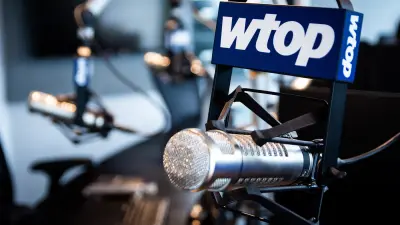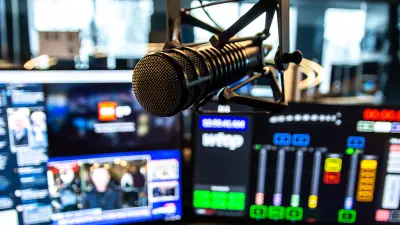Top U.S. radio station WTOP upgrades to Electro-Voice microphones at new facility

- Integrator Radio DNA designed the new 30,000 square-foot facility for the highest revenue radio station in the U.S.
- WTOP and sister station WFED are outfitted exclusively with Electro-Voice studio microphones for all news anchors, reporters and editors
- RE27N/D microphones were selected for all on-air studios; the 48 news production workstations are equipped with the RE320
As the perennial highest revenue radio station in the U.S., WTOP in Washington, DC, is in position to install any studio equipment they desire. Recently, the station moved to a massive 30,000 square-foot space in suburban Friendship Heights, MD, along with the Federal News Network (FNN), broadcasting as WFED. Minnesota-based broadcast integrator Radio DNA was engaged to design the new facility.

Everyone is saying the station sounds significantly better now, and that says a lot about the sound quality of the EV microphones.
“This project was really a treat to work on,” notes Radio DNA owner Rob Goldberg. “WTOP is owned by Hubbard Broadcasting, a fantastic company that believes in their staff and invests in their properties. They want their teams to have the best tools, so designing the facility for an all-news station in the nation’s capital was an exciting project.”
Because WTOP is focused on local content production, Radio DNA designed a work area featuring nine on-air studios, seven vocal booths, and 48 news production workstations, covering all manner of local and national news. The facility is built around an all-new GENC (Glass Enclosed Nerve Center), where editors track the news and schedule it for airing. For the 16 on-air studios, a total of 30 RE27N/D microphones are deployed. Reporters produce and file stories from their workstations, each of which is equipped with an RE320 microphone. All 78 mics are housed in Electro-Voice 309A suspension mounts, providing shock isolation and eliminating cable noise.
“The change to EV mics actually started in the old WTOP studios, where they used another brand,” notes Goldberg. “Over the past few years, they were trying different mics, and the RE27N/D was one of them. The WTOP engineering staff had noticed that they got better results in the studios that had the RE27s, so that was really the direction they were leaning before we recommended them. Same thing with the RE320s at all the workstations: They put the headphones on and fell in love with the sound almost instantly.”
Both microphone models are based on the form factor of the classic Electro-Voice RE20, which is celebrating its 50th anniversary in 2019. Both the RE27N/D and RE320 feature a neodymium magnet structure, multiple response shaping options, and Variable-D technology for proximity control. At WTOP, all microphones are run with flat response. The only processing used is a bit of limiting for consistent volume and some noise gating to minimize unwanted noise from HVAC and other environmental sources.
The new microphones provide a pristine front end for the station’s upgraded audio chain, which features AoIP (Audio over IP) architecture with digital sourcing throughout. The new facility features a virtual mixing system with an integrated SIP-based phone system that allows virtually any outside phone source to be routed directly on-air or to a reporter’s workstation with equal ease. After installation, testing, and training for the staff, the new studios went on-air in early February.
“This was a massive project, designed and built from the studs to the finished product,” notes Rob Goldberg. “A lot of new technologies were integrated, much of which had never been done on such a large scale. But the bottom line is that the vast majority of content on both WTOP and the WFED is voice, and the reaction to the new Electro-Voice studio mics has been enthusiastic to say the least. Everyone is saying the station sounds significantly better now, and that says a lot about the sound quality of the EV microphones.”

